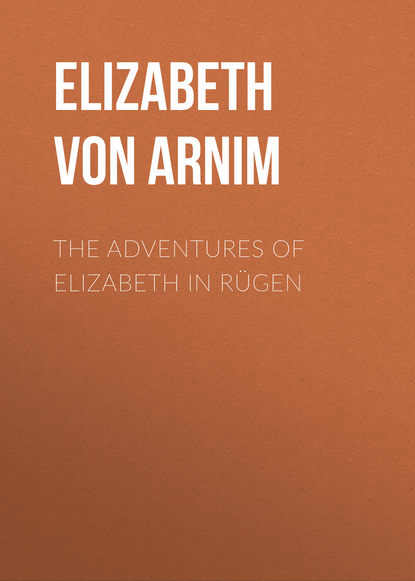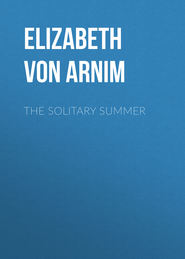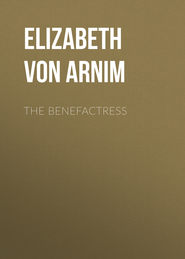По всем вопросам обращайтесь на: info@litportal.ru
(©) 2003-2024.
✖
The Adventures of Elizabeth in Rügen
Настройки чтения
Размер шрифта
Высота строк
Поля
'Do,' I called back, smiling; but he could not have heard.
Once again I slowly walked through the trees to the cliffs. The highest of these cliffs, the Königsstuhl, jutting out into the sea forms a plateau where a few trees that have weathered the winter storms of many years stand in little groups. For a long while I sat on the knotted roots of one of them, listening to the slow wash of the waves on the shingle far below. I saw the ribbon of smoke left by the Harvey-Browne's steamer get thinner and disappear. I watched the sunset-red fade out of the sky and sea, and all the world grow grey and full of secrets. Once, after I had sat there a very long time, I thought I heard the faint departing whistle of a far-distant train, and my heart leapt up with exultation. Oh the gloriousness of freedom and silence, of being alone with my own soul once more! I drew a long, long breath, and stood up and stretched myself in the supreme comfort of complete relaxation.
'You look very happy,' said a rather grudging voice close to me.
It belonged to a Fräulein of uncertain age, come up to the plateau in galoshes to commune in her turn with night and Nature; and I suppose I must have been smiling foolishly all over my face, after the manner of those whose thoughts are pleasant.
A Harvey-Browne impulse seized me to stare at her and turn my back, but I strangled it. 'Do you know why I look happy?' I inquired instead; and my voice was as the voice of turtle-doves.
'No—why?' was the eagerly inquisitive answer.
'Because I am.'
And nodding sweetly I walked away.
THE EIGHTH DAY
FROM STUBBENKAMMER TO GLOWE
When Reason lecturing us on certain actions explains that they are best avoided, and Experience with her sledge-hammers drives the lesson home, why do we, convinced and battered, repeat the actions every time we get the chance? I have known from my youth the opinion of Solomon that he that passeth by and meddleth with strife belonging not to him, is like one that taketh a dog by the ears; and I have a wise relative—not a blood-relation, but still very wise—who at suitable intervals addresses me in the following manner:—'Don't meddle.' Yet now I have to relate how, on the eighth day of my journey round Rügen, in defiance of Reason, Experience, Solomon, and the wise relative, I began to meddle.
The first desire came upon me in the night, when I could not sleep because of the mosquitoes and the constant coming into the pavilion of late and jovial tourists. The tourists came in in jolly batches till well on towards morning, singing about things like the Rhine and the Fatherland's frontiers, glorious songs and very gory, as they passed my hastily-shut window on their way round to the door. After each batch had gone I got out and cautiously opened the window again, and then waited for the next ones, slaying mosquitoes while I waited; and it was while I lay there sleepless and tormented that the longing to help reunite Charlotte and her husband first entered my head.
It is true that I was bothered for some time trying to arrive at a clear comprehension of what constitutes selfishness, but I gave that up for it only made my head ache. Surely Charlotte, for instance, was intensely selfish to leave her home and, heedless of her husband's unhappiness, live the life she preferred? But was not he equally selfish in wanting to have her back again? For whose happiness would that be? He could not suppose for hers. If she, determined to be unselfish, went home, she would only be pandering to his selfishness. The more she destroyed her individuality and laid its broken remains at his feet, the more she would be developing evil qualities in the acceptor of such a gift. We are taught that our duty is to make each other good and happy, not bad and happy; Charlotte, therefore, would be doing wrong if, making the Professor happy, she also made him bad. Because he had a sweet way with him and she had not, he got all the sympathy, including mine; and of course the whole of that windy mass of biassed superficiality called Public Opinion was on his side. But how can one, if one truly loves a woman, wish her to live a life that must make her wretched? Such love can only be selfish; accordingly the Professor was selfish. They were both selfish; and if one were not so the other would be more so. And if to be unselfish meant making those about you the opposite, then it must be wrong; and were it conceivable that a whole family should determine to be unselfish and actually carry out the dreadful plan, life in that doomed house would become a perpetual combat de générosité, not in any way to be borne. Here it was that my head began to ache. 'What stuff is this?' I thought, veering round suddenly to the easeful simplicity of the old conventions. 'Just to think of it gives me a headache. The only thing I know of that does not give a woman a headache is to live the life for which she was intended—the comfortable life with a brain at rest and a body wholly occupied with benevolences; and if her meekness makes her husband bad, what does that matter in the end to any one but him? Charlotte ought to be very happy with that kind old man. Any woman would be. Her leaving him must have been owing to some trifling misunderstanding. I am sure it would be for her happiness to go back to him. She would grow quite round and mellow. Could I not do something, say something, to get her to give him another trial? I wish—oh, I wish I could!'
Now from time to time the wise relative quoted above amplifies his advice in the following manner:—'Of all forms of meddling that which deals with man and wife is, to the meddler, the most immediately fatal.'
But where are the persons who take advice? I never yet met them. When the first shaft of sunshine slanted through my window it fell on me in my dressing-gown feverishly writing to Charlotte. The eloquence of that letter! I really think it had all the words in it I know, except those about growing round and mellow. Something told me that they would not appeal to her. I put it in an envelope and locked it in my dressing-case till, unconscious of what was in store for her, she should send me her address; and then, full of the glow that warms the doer of good actions equally with the officious, I put on my bathing things, a decent skirt and cloak over them, got out of the window, and went down the cliff to the beach to bathe.
The water was icily cold in the shadow of the cliffs, but it was a wonderful feeling getting all the closeness of the night dashed off me in that vast and splendid morning solitude. Dripping I hurried up again, my skirt and cloak over the soaked bathing dress, my wet feet thrust into shoes I could never afterwards wear, a trickle of salt water marking the way I took. It was just five o'clock as I got in at the window. In another quarter of an hour I was dry and dressed and out of the window a second time—getting in and out of that window had a singular fascination for me—and on my way for an early exploring of the woods.
But those Stubbenkammer woods were destined never to be explored by me; for I had hardly walked ten minutes along their beechen ways listening to the birds and stopping every few steps to look up at the blue of the sky between the branches, before I came to the Hertha See, a mysterious silent pond of black water with reeds round it and solemn forest paths, and on the moss by the shore of the Hertha See, his eyes fixed on its sullen waters, deep in thought, sat the Professor.
'Don't tell me you have forgotten me again,' I exclaimed anxiously; for his eyes turned from the lake to me as I came over the moss to him in an unchanged abstraction. What was he doing there? He looked exceedingly untidy, and his boots were white with dust.
'Good morning,' I said cheerfully, as he continued to gaze straight through me.
'I have no doubt whatever that this was the place,' he remarked, 'and Klüver was correct in his conjecture.'
'Now what is the use,' I said, sitting down on the moss beside him, 'of talking to me like that when I don't know the beginning? Who is Klüver? And what did he conjecture?'
His eyes suddenly flashed out of their dream, and he smiled and patted my hand. 'Why, it is the little cousin,' he said, looking pleased.
'It is. May I ask what you are doing here?'
'Doing? Agreeing with Klüver that this is undoubtedly the spot.'
'What spot?'
'Tacitus describes it so accurately that there can be no reasonable doubt.'
'Oh—Tacitus. I thought Klüver had something to do with Charlotte. Where is Charlotte?'
'Conceive the procession of the goddess Nerthus, or Hertha, mother of the earth, passing through these sacred groves on the way to bless her children. Her car is covered, so that no eye shall behold her. The priest alone, walking by the side, is permitted to touch it. Wherever she passes holyday is kept. Arms are laid aside. Peace reigns absolute. No man may seek to slay his brother while she who blesses all alike is passing among her children. Then, when she has once more been carried to her temple, in this water thou here seest, in this very lake, her car and its draperies are cleansed by slaves, who, after performing their office, are themselves thrown into the water and left to perish; for they had laid hands on that which was holy, and even to-day, when we are half-hearted in the defence of our adorations and rarely set up altars in our souls, that is a dangerous thing to do.'
'Dear Professor,' I said, 'it is perfectly sweet of you to tell me about the goddess Nerthus, but would you mind, before you go any further, telling me where Charlotte is? When I last saw you you were whirling after her in a waggonette. Did you ever catch her?'
He looked at me a moment, then gave the bulging pocket of his waterproof a sounding slap. 'Little cousin,' he said, 'in me thou beholdest a dreamer of dreams, an unpractical greybeard, a venerable sheep's-head. Never, I suppose, shall I learn to remember, unaided, those occurrences that I fain would not forget. Therefore I assist myself by making notes of them to which I can refer. Unfortunately it seldom happens that I remember to refer. Thou, however, hast reminded me of them. I will now seek them out.' And he dragged different articles from the bulging pocket, laying them carefully on the moss beside him in tidy rows. But the fact of only one of the two handkerchiefs being there nearly put him off the track, so much and so long did he marvel where its fellow could be; also the sight of his extra pair of socks reminded him of the urgent need they were in of mending, and he broke off his search for the note-book to hold each up in turn to me and eloquently lament. 'Nein, nein, was fur Socken!' he moaned, with a final shake of the head as he spread them out too on the moss.
'Yes, they are very bad,' I agreed for the tenth time.
'Bad! They are emblematic.'
'Will you let me mend them? Or rather,' I hastily added, 'cause them to be mended?' For my aversion to needles is at least as great as Charlotte's.
'No, no—what is the use? There are cupboards full of socks like them in Bonn, skeletons of that which once was socks, mere outlines filled in with holes.'
'And all are emblematic?'
'Every single one.' But this time he looked at me with a twinkle in his eye.
'I don't think,' I said, 'that I'd let my soul be ruffled by a sock. If it offended me I'd throw it away and buy some more.'
'Behold wisdom,' cried the Professor gaily, 'proceeding from the mouth of an intellectual suckling!' And without more ado he flung both the socks into the Hertha See. There they lay, like strange flowers of yellow wool, motionless on the face of the mystic waters.
'And now the note-book?' I asked; for he had relapsed into immobility, and was watching the socks with abstracted eyes.
'Ach yes—the note-book.'
Being heavy, it was at the very bottom of what was more like a sack in size than a pocket; but once he had run his glance over the latest entries he began very volubly to tell me what he had been doing all night. It had been an even busier night than mine. Charlotte, he explained, had left Sassnitz by the Berlin train, and had taken a ticket for Berlin, as he ascertained at the booking-office, a few minutes before he took his. He arrived at the very last moment, yet as he jumped into the just departing train he caught sight of her sitting in a ladies' compartment. She also caught sight of him. 'I therefore gave a sigh of satisfaction,' he continued, 'lit my pipe, and, contemplating the evening heavens from the window, happy in the thought of being so near my little wife, I fell into an abstraction.'
I shook my head. 'These abstractions. Professor,' I observed, 'are inconvenient things to fall into. What had happened by the time you fell out again?'
'I found that I had emerged from my compartment and was standing on the ferry that takes the train across the water to Stralsund. The ancient city rose in venerable majesty–'
'Never mind the ancient city, dearest Professor. Look at your notes again—what was Charlotte doing?'
'Charlotte? She had entirely escaped my memory, so great was the pleasure excited in my breast by the contemplation of the starlit scene before me. But glancing away from the massive towers of Stralsund, my eye fell on the word "Frauen" on the window of the ladies' carriage. Instantly remembering Charlotte, I clambered up eager to speak to her. The compartment was empty.'
'She too was contemplating the starlit scene from the deck of the ferry?'
'She was not.'
'Were there no bags in the carriage?'
'Not a bag.'
'What had become of her?'











